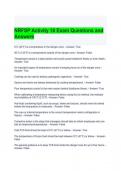Nrfsp activity - Study guides, Class notes & Summaries
Looking for the best study guides, study notes and summaries about Nrfsp activity? On this page you'll find 150 study documents about Nrfsp activity.
Page 3 out of 150 results
Sort by
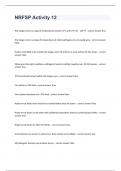
-
NRFSP Activity 12 correctly answered 2024/2025
- Exam (elaborations) • 2 pages • 2024
-
Available in package deal
-
- $9.99
- + learn more
NRFSP Activity 12The danger zone is a range of temperatures between 5°C and 57°C (41 - 135 F°) - correct answer True The danger zone is a range of temperatures at which pathogens do nut usually grow - correct answer False Food is most likely to be outside the danger zone if it is left on a work surface for four hours. - correct answer False When given the right conditions, pathogenic bacteria multiply roughly every 10-20 minutes. - correct answer True TCS food should be kept withi...
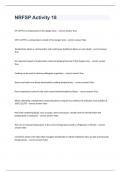
-
NRFSP Activity 18 verified already passed 2024
- Exam (elaborations) • 2 pages • 2024
-
Available in package deal
-
- $9.99
- + learn more
NRFSP Activity 186°C (43°F) is a temperature in the danger zone. - correct answer True 56°C (133°F) is a temperature outside of the danger zone - correct answer False Temperature abuse is a bad practice and could cause foodborne illness or even death - correct answer True An important aspect of temperature control is keeping food out of the danger zone. - correct answer True Cooking can be used to destroy pathogenic organisms. - correct answer True Spores and toxins are always...
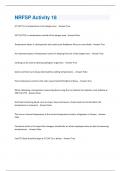
-
NRFSP Activity 18 Complete Questions And Answers
- Exam (elaborations) • 2 pages • 2024
- Available in package deal
-
- $7.99
- + learn more
6°C (43°F) is a temperature in the danger zone. - Answer-True 56°C (133°F) is a temperature outside of the danger zone - Answer-False Temperature abuse is a bad practice and could cause foodborne illness or even death - Answer-True An important aspect of temperature control is keeping food out of the danger zone. - Answer-True Cooking can be used to destroy pathogenic organisms. - Answer-True Spores and toxins are always destroyed by cooking temperatures. - Answer-False Poor temperatur...
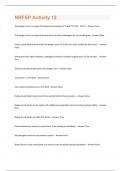
-
NRFSP Activity 12 Questions with complete Solutions!!
- Exam (elaborations) • 2 pages • 2024
-
- $7.99
- + learn more
The danger zone is a range of temperatures between 5°C and 57°C (41 - 135 F°) - Answer-True The danger zone is a range of temperatures at which pathogens do nut usually grow - Answer-False Food is most likely to be outside the danger zone if it is left on a work surface for four hours. - AnswerFalse When given the right conditions, pathogenic bacteria multiply roughly every 10-20 minutes. - AnswerTrue TCS food should be kept within the danger zone - Answer-False Cut melon is a TCS food -...
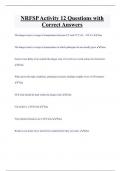
-
NRFSP Activity 12 Questions with Correct Answers
- Exam (elaborations) • 2 pages • 2024
- Available in package deal
-
- $5.49
- + learn more
NRFSP Activity 12 Questions with Correct Answers The danger zone is a range of temperatures between 5°C and 57°C (41 - 135 F°) True The danger zone is a range of temperatures at which pathogens do nut usually grow False Food is most likely to be outside the danger zone if it is left on a work surface for four hours. False When given the right conditions, pathogenic bacteria multiply roughly every 10-20 minutes. True TCS food should be kept within the danger zone False Cut melon is...
NRFSP Activity 18 Exam Questions and Answers
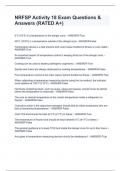
-
NRFSP Activity 18 Exam Questions & Answers (RATED A+)
- Exam (elaborations) • 1 pages • 2024
-
Available in package deal
-
- $8.49
- + learn more
NRFSP Activity 18 Exam Questions & Answers (RATED A+) 6°C (43°F) is a temperature in the danger zone. - ANSWER-True 56°C (133°F) is a temperature outside of the danger zone - ANSWER-False Temperature abuse is a bad practice and could cause foodborne illness or even death - ANSWER-True
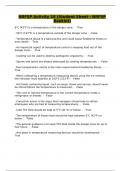
-
NRFSP Activity 18 (Student Sheet - NRFSP Booklet)
- Exam (elaborations) • 1 pages • 2024
- Available in package deal
-
- $7.49
- + learn more
NRFSP Activity 18 (Student Sheet - NRFSP Booklet)
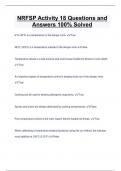
-
NRFSP Activity 18 Questions and Answers 100% Solved
- Exam (elaborations) • 2 pages • 2024
- Available in package deal
-
- $5.49
- + learn more
NRFSP Activity 18 Questions and Answers 100% Solved 6°C (43°F) is a temperature in the danger zone. True 56°C (133°F) is a temperature outside of the danger zone False Temperature abuse is a bad practice and could cause foodborne illness or even death True An important aspect of temperature control is keeping food out of the danger zone. True Cooking can be used to destroy pathogenic organisms. True Spores and toxins are always destroyed by cooking temperatures. False Poor tempe...
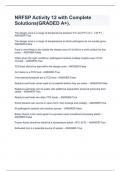
-
NRFSP Activity 12 with Complete Solutions(GRADED A+).
- Exam (elaborations) • 1 pages • 2024
-
- $8.49
- + learn more
NRFSP Activity 12 with Complete Solutions(GRADED A+). The danger zone is a range of temperatures between 5°C and 57°C (41 - 135 F°) - ANSWER-True The danger zone is a range of temperatures at which pathogens do nut usually grow - ANSWER-False

$6.50 for your textbook summary multiplied by 100 fellow students... Do the math: that's a lot of money! Don't be a thief of your own wallet and start uploading yours now. Discover all about earning on Stuvia



